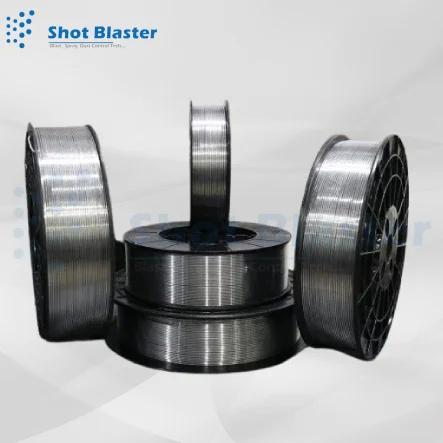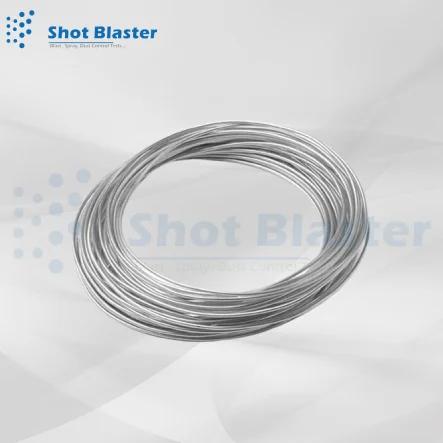Alloy Metalizing Wire For Thermal Spray Coating
Alloy metalizing wire contains a different composition of metal and varies in hardness. Metalizing wires are used in the thermal spray coating process to provide a thick metal coat on the component surface and prevent oxidation of components. Metalizing wire has different hardness and available in various sizes. Metallizing is the common title for the method of coating alloy on the exterior of non-metallic objects. Because a non-metallic article favors being a bad electrical conductor, the object's surface must be made conductive before plating can be performed. Alloy wires make these coatings stronger with a better surface finish.
There is a wide collection of various substances which can be converted into high-quality coatings via the thermal spray process. These can incorporate; metal, alloy, ceramic, plastic, and polymer and can be in the sort of powder, rod, or wire. The coating element can be individually selected for each specific substrate and the work that it has to do and so a related-perfect match can often be established between the two. As long as the element to be coated can resist the heat of the thermal spray coating method then almost any material can be covered using this method. However, there is also a quantity of particular spray coating methods which in fact use much more economical temperatures and so the range of substrate materials is still further improved.
Types of Alloy Metalizing Wire
Metalizing wires are widely used in many industries. Wires are available in many types and used in both pure metal form, and alloy form.
1. Zinc Aluminium Metalizing Wire
Zinc aluminium metalizing wire is manufactured by ultra-pure electrolytic zinc and aluminium. They are appropriate for flame spray gun, and electric arc alloy spraying. Their pureness matches 2.3 – zinc aluminium wires for thermic spraying, Through the EN ISO 14919 standard. Adopting a coating should be made precisely because it will decide the status of your work and forward the lifetime of your project. We have the information, experience, and quality of products that make it the perfect companion to make your choice easy.
2. Nickel and Nickel Alloy Metalizing Wire
Nickel metalizing wire utilizes a nickel base element among chromium and molybdenum. The corrosion properties are great in most situations and they can be sprinkled onto most elements including stainless steel or steel. It would be for use in paper Millhouse Digesters, shaft replacements that require corrosion protection as well as wear characteristics, the generic coating element for all series stainless components. Nickel Wire has been adopted in alloys that begin after the rise of advancement. Chemical division of artifacts has confirmed that weapons, tools, and coins include nickel in varying amounts.
Nickel in generic form or alloyed by other elements and materials has made important participation to our modern-day society and agrees to continue to provide materials for an even more imperious future. Nickel is a multifaceted element and will alloy by most metals. Complete solid solubility exists between nickel and copper. Broad solubility varies between iron, chromium, and nickel make many alloy combinations possible. Our wire is individual-bonding to materials with moderate hardness, where a surface preparation profile can be achieved. For sprinkling onto hard elements where a surface profile cannot be achieved, a bond coat of nickel alloy is recommended.
3. Tin Zinc Metalizing Wire
The Tin-Zinc alloy wires possess excellent engineering capability and solderability. They can give the sprinkled metal layer of film capacitors with great adhesion strength, and give capacitors excellent electrical show such as decreased loss angle. Tin-Zinc is obedient to WEEE directives on lead-free electric goods, as well as the requirements of the ISO 14000 method. Tin-Zinc wire is generally applied in DC & AC production units for spraying the edges of wound components of capacitors.
4. FeCrAl Metalizing Wire
The more aluminium content, in alliance with the more chromium content, makes the scaling temperature rise up to 1425 C (2600F ); Following the headline heat protection, these FeCrAl alloys are matched with generally used Fe and Ni-base alloys. As can be seen, the FeCrAl alloys possess excellent features as contrasted to the other alloys in most conditions. These wires are produced by powder metallurgy, which enhances the high-temperature durability quite considerably. they can therefore be done also in applications where high-temperature durability(creep strength) is of relevance. Thus, FeCrAl alloy wire is a ferritic superalloy.
5. Babbitt Metalizing wire
Babbitt metalizing wire is employed for coating this material will be tin or lead, antimony, or copper. Babbitt wire has a laborious and soft composition and that provides excellent low wear and friction resistance. Babbitt wire is employed for the protection of the food tank and produces an awfully dense coating layer of zero.25 to 0.65 metric linear unit over the substrate. Babbitt wire freezing point is 695 degrees Anders Celsius. Babbitt wires coating metals square measure employed in the high duty and high-speed bearings. Babbitt wire additionally|is additionally} employed in alloy forms also to supply coating employing a thermal applier or spray.
6. Bronze Metalizing wire
The bronze metalizing wire used to provide or supply a protective coating to the substrate. Aluminum bronze metalizing wire products Sprabronze AA and Sprabronze AB are used for wire feedstock thermal spray processes. Sprabronze S is a brass alloy wire and Sprabronze TM is a Tobin-type bronze. Bronze wire coatings are machinable and also use to achieve excellent finishing. Bronze wire and its alloy offer corrosion resistance especially in neutral atmospheres and water environments. Bronze wire coatings are recommended for soft bearing applications and machine element repair.
7. Brass Metalizing Wire
The brass metalizing wire is the ideal element to use when making electrical parts due to the fact that it is corrosion rebellious and has conductive features. These conductive characteristics came from the copper and zinc composition of brass wire. Because of their stability, these wires are utilized for electrical connectors. The lightweight and moldable brass strips are great to use for small diameter purposes. The brass wire can be manufactured in any length, dimensions, or form.
Alloy Metalizing Wire Manufacturer in India
We are an alloy metalizing wire manufacturer in India. We maintain thermal spray metalizing wires quality and provide the best services. We also manufacture, supply, and export sand blasting machine, Shot blasting machine, Sand blasting hopper, wire flame spray gun, zinc spray gun, thermal spray gun, arc spray gun, twin arc spray gun, metalizing gun, flame spray gun, zinc metalizing wire, zinc aluminium metalizing wire, nickel metalizing wire, copper metalizing wire, phosphorous bronze metalizing wire, tin metalizing wire, and blasting media like abrasive garnet, copper slag, steel shots, cut wire shots. Before thermal spray coating blasting is done for surface roughness.







